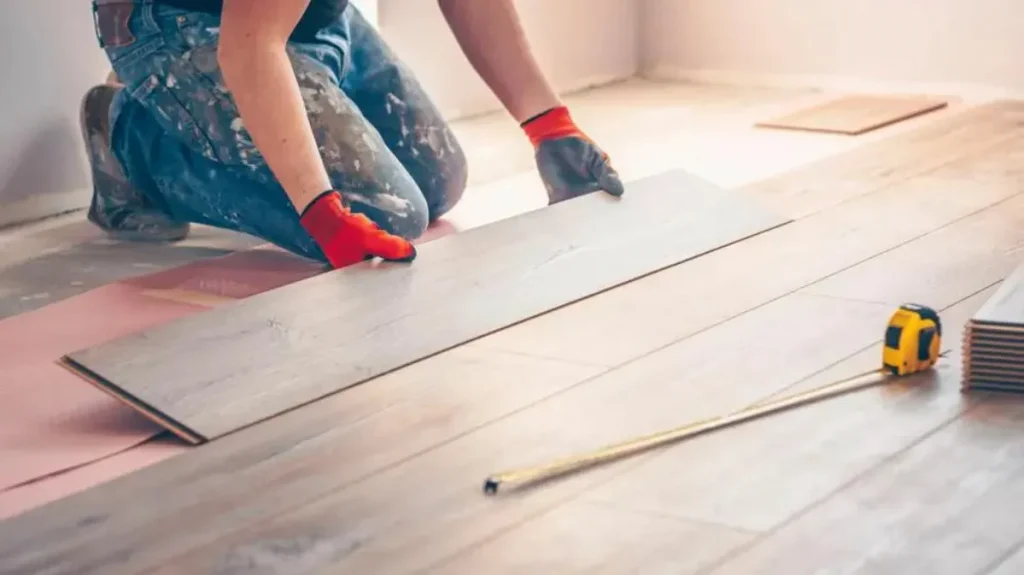Hardwood flooring is a popular choice for homeowners because of its timeless beauty and durability. However, many people may wonder how long they can expect their hardwood floors to last and what factors may impact their lifespan.
Understanding the average lifespan of hardwood flooring, as well as the various factors that can affect it, is crucial in making informed decisions about installation and maintenance. In this article, we will explore the typical lifespan of hardwood flooring and delve into the different factors that can influence its longevity.
From humidity levels to foot traffic, there are several variables that can impact how long your hardwood floors will last. By understanding these factors and implementing proper maintenance techniques, you can extend the life of your hardwood floors and enjoy them for years to come.
Average Lifespan of Hardwood Flooring
The average lifespan of hardwood flooring can vary depending on factors such as installation quality, maintenance practices, and environmental conditions.
On average, a well-maintained hardwood floor can last between 25 to 100 years. However, the actual lifespan of the floor will depend on several factors such as the thickness of the wood veneer, the type and quality of finish used, and the level of foot traffic in the area.
Moreover, it is worth noting that certain species of hardwood are more durable than others. For example, Brazilian cherry and maple are known for their durability and can last up to 50 years or more with proper care.
On the other hand, softer woods like pine or birch may require more frequent maintenance and refinishing to maintain their appearance over time.
Ultimately, by taking proper care of your hardwood floors and choosing a durable wood species when installing new flooring, you can extend its lifespan significantly.
Factors That Affect the Longevity of Hardwood Flooring
The longevity of hardwood flooring can be influenced by a number of factors. One critical factor is the amount of foot traffic that the floor receives, as this can cause wear and tear over time.
Additionally, changes in humidity and temperature levels may also take a toll on hardwood floors, causing them to expand or contract and potentially leading to damage.
Finally, exposure to sunlight can lead to fading or discoloration, impacting not only the aesthetics but also the overall quality of the flooring.
Understanding these key factors is essential for maintaining the integrity and longevity of hardwood flooring over time.
Amount of Foot Traffic
Foot traffic is a crucial factor to consider when assessing the longevity of hardwood flooring, as high levels of usage can significantly impact its lifespan. The more people that walk on the floor, the faster it will wear down and lose its luster.
This means that areas with heavy foot traffic, such as entryways or hallways, are more likely to show signs of wear and tear than other parts of the house.
To ensure that your hardwood flooring lasts as long as possible, it’s important to take steps to minimize foot traffic in high-use areas. This could mean adding rugs or mats in entryways or hallways, encouraging family members to remove their shoes before entering the home, or even rearranging furniture to reduce foot traffic in certain areas.
By taking these simple precautions, you can help extend the lifespan of your hardwood flooring and keep it looking beautiful for years to come.
Humidity and Temperature Changes
Managing humidity and temperature changes in indoor environments is crucial for maintaining the structural integrity of hardwood floors, as fluctuations in these factors can lead to warping, cracking, and other forms of damage.
Hardwood flooring is sensitive to moisture levels, which can cause the wood to expand or contract. When exposed to high levels of humidity, hardwood floors absorb moisture from the air causing them to swell. Conversely, when indoor environments lack humidity due to low temperatures or artificial heating systems, hardwood floors tend to shrink and develop cracks.
Temperature changes also affect the longevity of hardwood flooring. Extreme heat can cause the wood boards to dry out leading to splitting or cupping. Cold temperatures on the other hand slow down metabolic reactions within the wood fibers causing them to become brittle and prone to breakage.
To prevent such issues, homeowners should maintain a consistent temperature and relative humidity level in their homes by using humidifiers during dry seasons or air conditioning units during hot summers. By keeping an optimal environment for their hardwood floors, homeowners can mitigate potential damage caused by fluctuations in humidity and temperature thus extending its lifespan.
Exposure to Sunlight
Exposure to sunlight can significantly alter the appearance of hardwood floors over time. Direct and prolonged exposure to sunlight can cause fading, bleaching, and discoloration on hardwood flooring. This is because ultraviolet (UV) rays from the sun break down the chemical bonds in wood, causing it to change color.
The extent of damage caused by sunlight depends on various factors such as the type of finish used on the floor, the species of wood, and the location of windows or doors that allow direct sunlight into a room.
To minimize sun damage, homeowners should consider installing UV-resistant window films or shades that filter out harmful rays while still allowing natural light into their homes. Additionally, applying protective coatings like sealants or finishes with UV inhibitors can help extend the life and appearance of hardwood floors exposed to sunlight.
Tips for Maintaining and Extending the Lifespan of Hardwood Flooring
Regular maintenance and care can significantly increase the lifespan of hardwood flooring, potentially extending it beyond its average lifespan of 25 to 30 years. Simple measures such as regular sweeping, vacuuming, and mopping with a damp cloth can help keep dirt and debris from scratching or dulling the surface of the floors. Using furniture pads or felt protectors on chair legs and other heavy furniture can also prevent scratches or dents.
Additionally, placing doormats at entrances to catch dirt and moisture from shoes can help prevent damage from outside elements. Other important factors to consider include humidity control, sunlight exposure, and avoiding harsh chemicals when cleaning your hardwood floors. Keeping indoor humidity levels between 35% to 55% helps prevent warping or cracking due to changes in moisture levels.
Sunlight exposure can cause fading or discoloration over time; using window treatments like curtains or blinds during peak sunlight hours can help minimize this effect. Lastly, avoiding harsh chemicals like ammonia-based cleaners that strip away natural oils in the wood is key to maintaining a healthy shine for your hardwood floors.
By following these tips for maintenance and care, you can extend the lifespan of your hardwood flooring while keeping it looking beautiful for years to come. Taking good care of your hardwood flooring not only prolongs its life but also adds value to your home. Hardwood floors are a highly sought-after feature in real estate properties due to their durability, beauty, and easy maintenance with proper upkeep techniques.
So why not invest some time into caring for what could be one of the most valuable assets in your home? With regular attention paid towards cleanliness, protection against scratches/dents/UV rays/humidity fluctuations etc., you’ll be able to enjoy stunning hardwood floors that will last many years longer than they would otherwise!
Frequently Asked Questions
Is hardwood flooring more expensive than other types of flooring?
Hardwood flooring can be more expensive than other types of flooring, depending on the specific material and installation costs. However, it is a durable and long-lasting option that adds value to a home or business.
Can hardwood flooring be installed in areas with high moisture levels, such as bathrooms or kitchens?
Hardwood flooring can be installed in bathrooms and kitchens but requires careful consideration of moisture levels and proper maintenance. Its lifespan varies based on factors like wood species, installation quality, and usage patterns, typically lasting 20-100 years.
How often should hardwood flooring be refinished to maintain its longevity?
Refinishing frequency for hardwood flooring depends on factors such as traffic, wear and tear, and wood species. Annual assessments by a professional can determine the best course of action to maintain its longevity.
Are there any types of hardwood flooring that are more durable than others?
Some hardwood species like Brazilian Cherry and Brazilian Walnut are known for their exceptional durability. However, the lifespan of any hardwood flooring depends on factors such as maintenance, foot traffic, humidity levels and exposure to sunlight.
What should I do if my hardwood flooring becomes scratched or damaged?
In the event of scratches or damage to hardwood flooring, it’s important to assess the severity of the issue. Light scratches can often be remedied with sanding and refinishing, while deeper damage may require replacement. Seek professional advice for optimal results.
Conclusion
In conclusion, the lifespan of hardwood flooring can vary depending on a multitude of factors. However, on average, it can last anywhere from 25 to 100 years with proper maintenance and care.
The quality and type of wood used, the installation process, and the level of foot traffic are just some examples of variables that can impact the longevity of hardwood flooring.
To put this into perspective, one could compare the lifespan of hardwood flooring to that of a living organism – both require specific conditions for survival and can be affected by external factors.
Just as a plant needs sunlight, water, and nutrients to thrive, hardwood flooring requires regular cleaning and refinishing to maintain its appearance and durability. And just as an animal’s health can be impacted by environmental changes or disease, hardwood flooring’s lifespan can be shortened by exposure to moisture or excessive wear.
Ultimately, investing in high-quality hardwood flooring and following proper maintenance practices is key to ensuring its longevity. By doing so, homeowners can enjoy the timeless beauty and value that hardwood floors provide for many years to come.



